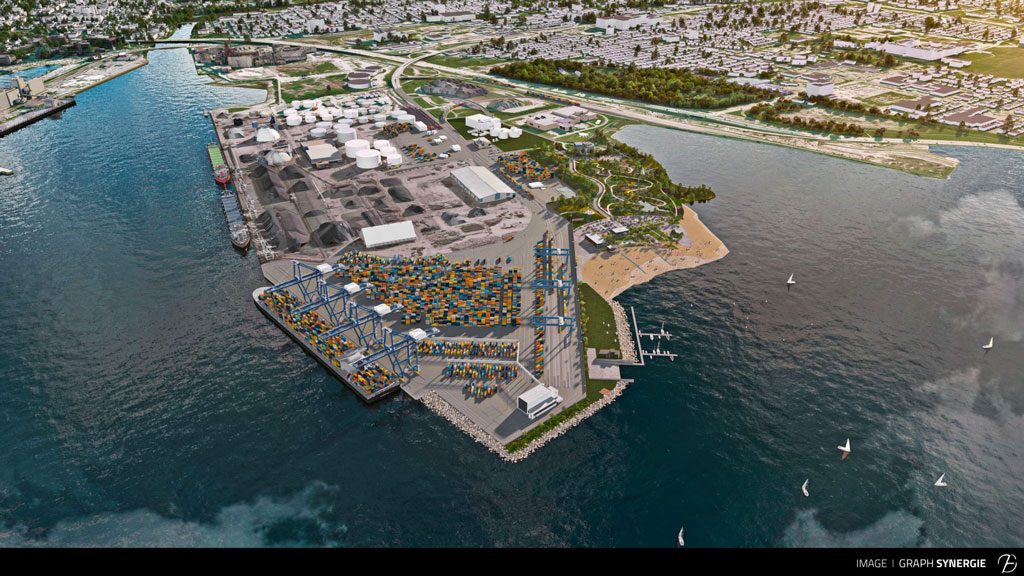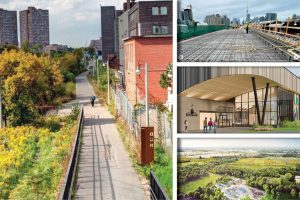The federal government has sunk a proposed $775-million deep water container terminal in Quebec City that was expected to created thousands of construction jobs and reduce greenhouse gases across the logistics chain.
The project, called Laurentia, would have been the greenest deep water container terminal in North America and, in three years time, provided the fastest and most cost-effective waterway access to North American markets by opening a new marine highway between the Port of Quebec and Southeast Asia.
However, federal Environment Minister Jonathan Wilkinson issued a statement recently that indicated “the significant adverse environmental effects that the designated project is likely to cause are not justified in the circumstances.”
The Quebec Port Authority (QPA) had been working on the proposal for the better part of six years. The project had been referred to the federal Cabinet for a decision after the Impact Assessment Agency of Canada (IAAC) decided that two of 22 environmental issues that were studied would have adverse effects.
The IAAC had concluded the project was likely to cause significant adverse environmental effects to fish and fish habitat, in particular the population of striped bass, air quality and human health, socio-economic conditions, and the current use of lands and resources for traditional purposes by Indigenous people.
Officials at the QPA were confident a decision would confirm that measures being proposed by the port to mitigate the effects were enough to satisfy the Cabinet but on June 29 Wilkinson handed down the verdict.
Port of Quebec president and CEO Mario Girard said he is disappointed with the decision and an in-depth analysis of the federal government’s decision will be conducted in the coming months to assess the port’s future growth. The decision does not prevent the QPA from submitting new project proposals.
“We are obviously very disappointed by this outcome,” said Girard. “It’s unfortunate that we weren’t able to reconcile our experts’ opinions with those of the experts at Fisheries and Oceans Canada and the Impact Assessment Agency of Canada, particularly regarding striped bass.
“We remain convinced that there were workable solutions and that Laurentia was a fundamentally good project, both for the economy and for the environment. But today we need to accept the verdict of the federal authorities and look to the future.”
The port had proposed extending the line of the existing wharf eastward by 610 metres in order to operate a deep-water terminal dedicated to containerized general cargo. The 31.7-hectare project would have included construction of a new berth and a retaining dike that would allow for the development of an additional 17 hectares of backshore space, along with construction of rail lines and road accesses.
The QPA said in a statement that the terminal project was designed to meet the highest environmental standards with the greenest and most advanced technologies on the market and innovative initiatives that would have significantly reduced the impacts of the project.
Laurentia would also have delivered an overall GHG reduction of 84,000 tonnes per year across the logistics chain, including seven million fewer kilometres of trucking on Quebec roads alone, the QPA statement read. Ultra-high-performance electric and hybrid equipment would have been used at the terminal.
Girard said the port’s two business partners, CN and Hutchison, and the Government of Quebec and Huron-Wendat Nation shared the belief in the fundamental value of the project and provided great support.
The port took a number of measures to protect the environment during the construction phase of the project, including strict requirements that contractors bidding on work would have to use heavy equipment with engines that emit fewer contaminants and keep the site watered down to stop dust going into nearby neighbourhoods. Trucks would also be required to drive at reduced speeds and equipment would be cleaned frequently.
To protect the marine ecosystem, the port would have required contractors to use materials that are free of aggregates smaller than 10 millimetres, to contain infill work with dikes, and to use air bubble screens to limit introducing suspended solids into fish habitats.
The port was committed to carrying out a carbon neutral project in both the construction and operational phases by working with electric or hybrid trucks and construction equipment that uses innovative technologies. A study on air quality risks related to the project also concluded that it would have an insignificant and negligible impact on health risks resulting from atmospheric emissions of gaseous and particulate pollutants.
However, after rigorous review, both the IAAC and Cabinet felt the measures weren’t enough. Cabinet decided that the potential significant direct and cumulative adverse environmental effects are not justified in the circumstances.
“The Impact Assessment Agency of Canada led an exhaustive environmental assessment that highlighted the possibility for significant adverse environmental effects on a number of components associated with the project, many of which would be irreversible,” said Wilkinson. “The Government of Canada must make decisions based on the best available scientific evidence while balancing economic and environmental considerations.
“This was a difficult decision — but the right one as we look to grow the economy and protect the environment for future generations.”











Recent Comments
comments for this post are closed